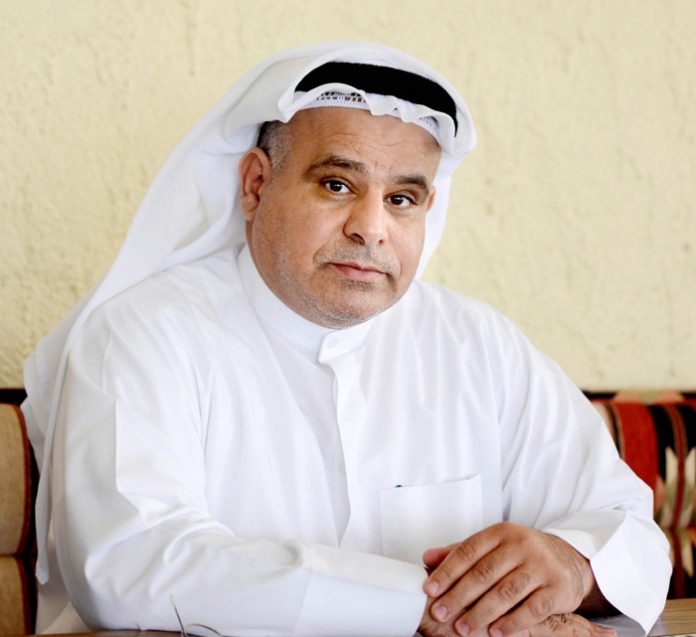Tete-a-tete with Khaled Al Razni
For almost nine years from 1995, he was the most prominent Kuwaiti face in India; in the media circles, in the political and diplomatic circles, in official receptions and even at social gatherings. Khaled Al Razni who joined the Kuwait Embassy in India as Information Attaché way back in 1995 soon made his dent in the burgeoning Indian media market with his easy accessibility, his emphatic and yet polite ways to put across his country’s point of view, his desire to bring people of the two friendly nations closer to each other.
It was during his tenure that Information Section from the Embassy was segregated and he became the Director of Information for South East Asia region with the office located within the Embassy premises. Khaled tenure also saw tremendous diplomatic movement between India and Kuwait, many of which he himself was architect. “It was difficult time for us as my country was emerging from the shadow of the illegal occupation by Iraq and we had pressing problem like the POW’s and continuous threats from across Iraq looming every time”, he recalled during a tete-a-tete with The Times recently.
A man of action known for his bolero smile and energy to work to perfection, Khaled knew the success of his mission was dependent on his close access to the Indian media and through them the social interactive groups. He made his entry into the Press Club of India, often sitting with friends, with Foreign Correspondents and engaging with journalists to put across his views on the subject.
Khaled recalled this to be tedious task. “We are a small nation with not much of interaction between common Indians
and Kuwaitis. So I decided to set up a Diwaniya to showcase our culture to the people of India starting from Jaipur, capital of Indian state of Rajasthan. The Diwaniya was a great success in India as people first came to see the window of democracy in this institution and how issues from domestic and international level are discussed”
From Jaipur, Khaled took this concept to many Indian states including Lucknow, Delhi and even in the southern part.
“For the first time many in India many experienced Kuwaiti culture, our food and our tradition and could identify with their own. Believe me we had Indian ministers coming to see what Diwaniya is all about, they were so happy to witness which they felt had some identity with their own culture and ethos”, he remembered.
While Diwaniya provided Khaled with an opportunity to foray into the India media, he made many friends and suddenly major newspapers were writing about Kuwait, apart from invasion and oil. Khaled Razni had eventually arrived at the Indian scene with a bang.
That was also a difficult time as Khaled himself admits that the PoW (prisoner of War) problem was a big issue for Kuwait and his next step was to elicit support from the Indian media so that it got international recognition.” So I spoke to His Excellency our Ambassador and decided to invite our Chairman of the PoW group, our leaders, academician from Kuwait time to time”
So many seminars and meetings were held in India that the PoW issue became a focal point of discussion. “From University level to Press Club to social groups we involved and took the delegates to discuss the issue threadbare while our leaders were meeting the decision makers in the Indian government” Khaled says he was so delighted that the meeting in the Press Club attracted top Indian media.
But little did he know that the measures which he was taking would stir a hornet nest as the Iraqi Ambassador Saleh Al Mukhtar who himself had a journalistic backgrpoud also went on offensive. For many months it was a virtual war of words between Khaled and Ambassador Mukhtar in the columns of Indian media.
Indeed the battle royal tilted in favour of Khaled when India’s leading eveninger printed a point to point rejoinder of Mukhtar’s allegation .
“I knew we had a strong case and it has been proved with the discovery of so many graves in Iraq after Saddam Husain was deposed. Our stand all these years was vindicated and our friend from India media congratulated me to taking the stand so aggressively”.
Khaled nine year tenure also saw a regular publication of an in-house magazine Kuwaiti News in English, Kuwait Samachar in Hindi, setting up Kuwait Indian Chamber of Commerce and also setting up Kuwait Embassy Information Department interactive website. Not many know that the then Indian Home Minister L K Advani came to inaugurate the website, a rare gesture that speaks volumes of his interaction with the Indian people.
Besides this in his tenure there were regular exchanges between India and Kuwait journalistic circles and a series of activities that actually brought Kuwait very close to the people of India. “People to people contact was so essential in my strategy and I am so happy it worked”
Nine years of stay in India was so gratifying, Khaled recalls, every moment was a challenge, every day came up with new issues. “India is such a diversified country, full of life and action and it was great satisfaction to work in this multilingual and multiethnic country and to do something good”.
Back in Kuwait, Khaled rejoined the ministry in 2004 and worked on developing new modules of database and engaging in many events. Right know he is on a sabbatical and working on his dream project on developing Information Bank of his country both in Arabic and English, undeniably a daunting task indeed. But those who know Khaled are confident that his zest to work and to carve out a niche he would come out with a marvel of a document.
– Staff Report

















